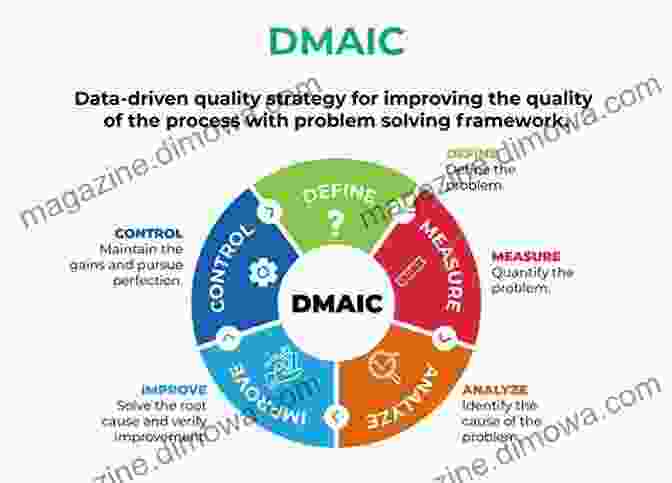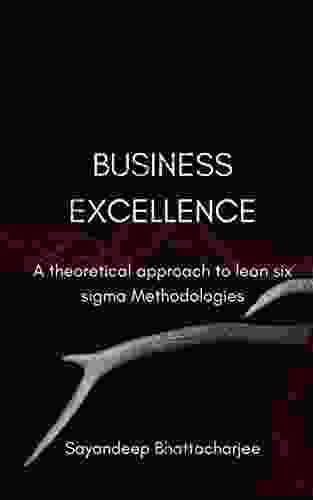Theoretical Approach To Lean Six Sigma Methodologies

In today's competitive business landscape, organizations are constantly striving to improve their efficiency, effectiveness, and profitability. Lean Six Sigma is a powerful methodology that has emerged as a cornerstone of operational excellence, enabling businesses to identify and eliminate waste, streamline processes, and achieve significant cost savings.
4.2 out of 5
| Language | : | English |
| File size | : | 16296 KB |
| Text-to-Speech | : | Enabled |
| Screen Reader | : | Supported |
| Enhanced typesetting | : | Enabled |
| Word Wise | : | Enabled |
| Print length | : | 78 pages |
| X-Ray for textbooks | : | Enabled |
| Paperback | : | 288 pages |
| Item Weight | : | 12.8 ounces |
| Dimensions | : | 6.29 x 1.83 x 8.87 inches |
| Hardcover | : | 111 pages |
This comprehensive article provides a theoretical exploration of Lean Six Sigma methodologies, delving into the fundamental principles, tools, and techniques that underpin this transformative approach.
The DMAIC Cycle
The DMAIC cycle is the cornerstone of Lean Six Sigma, representing a structured framework for process improvement. It consists of five phases:
- Define: Clearly define the problem or opportunity to be addressed.
- Measure: Collect and analyze data to establish a baseline for measurement.
- Analyze: Identify the root causes of the problem or opportunity.
- Improve: Develop and implement solutions to address the root causes.
- Control: Monitor and sustain the improvements achieved.
Statistical Tools
Statistical tools play a crucial role in Lean Six Sigma, providing a quantitative basis for decision-making and process improvement. Key statistical tools include:
- Descriptive Statistics: Summarize data using measures such as mean, median, and standard deviation.
- Hypothesis Testing: Test hypotheses about population parameters using statistical tests, such as t-tests and ANOVA.
- Regression Analysis: Identify relationships between variables and build predictive models.
- Statistical Process Control (SPC): Monitor and control processes using statistical techniques, such as control charts.
Change Management
Lean Six Sigma initiatives often require significant organizational change, which can be challenging to navigate. Effective change management strategies are essential to ensure successful implementation.
Key principles of change management in Lean Six Sigma include:
- Leadership: Provide strong leadership and support for change.
- Communication: Communicate the need for change and keep stakeholders informed.
- Training: Provide training and development opportunities to upskill employees.
- Resistance Management: Identify and address potential resistance to change.
- Sustainability: Embed changes into the organization's culture and processes.
Benefits of Lean Six Sigma
Organizations that successfully implement Lean Six Sigma methodologies can reap significant benefits, including:
- Reduced Costs: Eliminate waste and streamline processes to save money.
- Improved Quality: Reduce defects and errors, leading to higher customer satisfaction.
- Increased Efficiency: Optimize processes to reduce cycle times and improve throughput.
- Enhanced Productivity: Empower employees through training and development.
- Competitive Advantage: Gain an edge over competitors by achieving operational excellence.
Lean Six Sigma is a powerful and systematic approach to process improvement that can transform organizations, unlocking operational excellence and driving sustained success. By embracing the DMAIC cycle, leveraging statistical tools, and implementing effective change management strategies, organizations can harness the power of Lean Six Sigma to achieve their goals and create a culture of continuous improvement.
This article has provided a comprehensive overview of the theoretical foundations of Lean Six Sigma methodologies. For a deeper dive into the practical application of these concepts, consider exploring the following resources:
- Lean Six Sigma Institute
- American Society for Quality
- iSixSigma
Unlock the full potential of your organization by embracing Lean Six Sigma methodologies and embarking on the journey to operational excellence.

4.2 out of 5
| Language | : | English |
| File size | : | 16296 KB |
| Text-to-Speech | : | Enabled |
| Screen Reader | : | Supported |
| Enhanced typesetting | : | Enabled |
| Word Wise | : | Enabled |
| Print length | : | 78 pages |
| X-Ray for textbooks | : | Enabled |
| Paperback | : | 288 pages |
| Item Weight | : | 12.8 ounces |
| Dimensions | : | 6.29 x 1.83 x 8.87 inches |
| Hardcover | : | 111 pages |
Do you want to contribute by writing guest posts on this blog?
Please contact us and send us a resume of previous articles that you have written.
 Book
Book Novel
Novel Page
Page Chapter
Chapter Text
Text Story
Story Genre
Genre Reader
Reader Library
Library Paperback
Paperback E-book
E-book Magazine
Magazine Newspaper
Newspaper Paragraph
Paragraph Sentence
Sentence Bookmark
Bookmark Shelf
Shelf Glossary
Glossary Bibliography
Bibliography Foreword
Foreword Preface
Preface Synopsis
Synopsis Annotation
Annotation Footnote
Footnote Manuscript
Manuscript Scroll
Scroll Codex
Codex Tome
Tome Bestseller
Bestseller Classics
Classics Library card
Library card Narrative
Narrative Biography
Biography Autobiography
Autobiography Memoir
Memoir Reference
Reference Encyclopedia
Encyclopedia Le Nguyen Binh
Le Nguyen Binh Summer Lane
Summer Lane Joan Johnston
Joan Johnston Martina Meier
Martina Meier Warner Wolf
Warner Wolf Joel Chandler Harris
Joel Chandler Harris Jim Fergus
Jim Fergus Karen Latchana Kenney
Karen Latchana Kenney Jing Guo
Jing Guo Joe Fleischer
Joe Fleischer Luke Daly Groves
Luke Daly Groves Matt Vincent
Matt Vincent John Dewey
John Dewey Karen Clark
Karen Clark Joanna Burger
Joanna Burger Ruby Winter
Ruby Winter Jonathan Northall
Jonathan Northall Joey Percia
Joey Percia Jini Reddy
Jini Reddy Johann Jakob Von Tschudi
Johann Jakob Von Tschudi
Light bulbAdvertise smarter! Our strategic ad space ensures maximum exposure. Reserve your spot today!

 Bruce SnyderUnlock the Secrets to Product Success: Discover the Revolutionary Guide to...
Bruce SnyderUnlock the Secrets to Product Success: Discover the Revolutionary Guide to...
 Everett BellBonaire Through Insatiably Curious Child: An Educational Adventure for Young...
Everett BellBonaire Through Insatiably Curious Child: An Educational Adventure for Young... Drew BellFollow ·13.3k
Drew BellFollow ·13.3k Fletcher MitchellFollow ·3.1k
Fletcher MitchellFollow ·3.1k Wesley ReedFollow ·3.3k
Wesley ReedFollow ·3.3k Ray BlairFollow ·10.9k
Ray BlairFollow ·10.9k Owen SimmonsFollow ·13.8k
Owen SimmonsFollow ·13.8k Edgar HayesFollow ·11.4k
Edgar HayesFollow ·11.4k Aldous HuxleyFollow ·17.7k
Aldous HuxleyFollow ·17.7k Guillermo BlairFollow ·14.5k
Guillermo BlairFollow ·14.5k

 Joshua Reed
Joshua ReedTake Your Marketing Business Into The Next Level
Are you ready to...

 Aaron Brooks
Aaron BrooksFrom Fourier to Cauchy-Riemann: Geometry Cornerstones
From Fourier to Cauchy-Riemann: Geometry...

 Orson Scott Card
Orson Scott CardUnveiling the Art of Mitigation Banking: A Comprehensive...
In the intricate dance between...

 Victor Hugo
Victor HugoUnleash Your Creativity: A Journey Through the Enchanting...
Prepare to be captivated as we...

 Duncan Cox
Duncan CoxLoad of Bull: An Englishman's Adventures in Madrid
By Simon Bunce ...
4.2 out of 5
| Language | : | English |
| File size | : | 16296 KB |
| Text-to-Speech | : | Enabled |
| Screen Reader | : | Supported |
| Enhanced typesetting | : | Enabled |
| Word Wise | : | Enabled |
| Print length | : | 78 pages |
| X-Ray for textbooks | : | Enabled |
| Paperback | : | 288 pages |
| Item Weight | : | 12.8 ounces |
| Dimensions | : | 6.29 x 1.83 x 8.87 inches |
| Hardcover | : | 111 pages |










